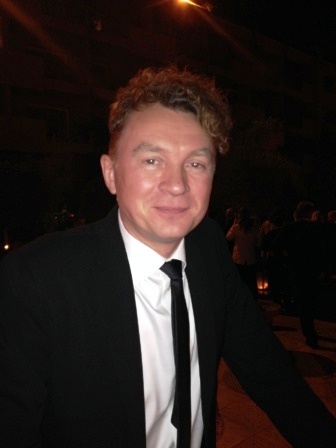The most stirring encounter I had at the Marrekech film festival last week was a fight with a director.
I met director Ignas Jonynas the first night, at a huge cocktail-dinner party at the Sofitel, with so many banquet tables of oysters, broiled shrimp, tajine chicken, sauced fish, roasted lamb and hummus, that I got lost among the fountains, searching for champagne, until I came upon this table of tall Lithuanians.
"Greetings," the tall Lithuanian director said, and cheered my white glass of wine (no champagne to be found).
"Cheers," I said.
He animatedly told me about his film in the festival: co-written with his friend a philosophy professor in Vilnius, it was about a doctor who organizes a betting pool with his colleagues in the hospital to make money off the patients' lives, provided they die with the lowest odds of doing so.
"Sounds grim," I said.
"It is grim!" the director said. "It is this way. I know -- I have worked in many jobs. With mentally ill patients in a psychiatric hospital, as a bartender, as a construction worker.... I have seen people act out of egotism just like this."
The lead of the film, a handsome fiftiesh man (also tall), happened to be at our table.
"Life is a bet," he concurred, lifting his glass of rosé.
"Yes a bet," the director said. "Everything we do is to bet on our wins and losses, to survive."
"Sounds grim," I said.
"It IS grim!" the director said.
"We are just a raindrop, dripping to the ground," interjected the semblant doctor. He gestured with his hands a small raindrop disappearing into nought. "I myself have tried everything: meditation, Eastern spirituality. Many things. And this is my conclusion. We are nothing in the universe. It is worthless to even try."
"Your own actions prove otherwise," I said. "You tried to get a lead role in a film. You tried to be an actor. It just didn't happen. You engineered it. And, I will add, you made it happen. You are no raindrop."
"No, it just happened," the doctor-actor said dismally, dropping his hands with a lackadaisical sigh.
I went off in search of champagne.
Three days later I saw the film. It was more bleak than I expected: The characters, most of them, lacked any sense of humanity; the colors of the film seemed deliberately ugly, grey and shabby. An interesting subtext: poverty. It seemed that many of the characters were struggling to get a coin or two extra, just to survive, or help their children survive, and nobody would help.
The movie infuriated me.
It also changed my night. As soon as I left, I glared at the cab driver. "Put on the meter!" I said, suspecting he too was going to ask for a dirham too many.
"Doesn't work," he said, a bad coincidence.
My usual jolly conversation with the cabbie did not ensue. I glared when I stepped out the door.
The next cab driver -- who took me off to another luxurious party, this time in honor of the Scandinavian films of the festival -- asked five times the normal price of the ride.
Responding to my new post-film glare, however, he gave half of it back.
The first people I saw at the Scandinavian party -- after a greeting by ten men on horseback, dressed in traditional Moroccan garb at the entry, blowing horns -- were the Lithuanian director, the philosophy teacher and the actor, each standing with a glass of white wine.
"So?" the director said, staring me directly in the eye. "My film? What do you think?"
"It is so negative!" I said.
"Negative? Good. This is the way it is. We have to show that. I am glad you found it negative."
"A bit too pessimistic," I said.
"No, realistic." he said.
"No, pessimistic," I said in turn. "Things must be pretty bad in Lithuania."
"They are bad. I know. I have seen people act like this. From my jobs, in this new economy. My film is very appreciated in Lithuania. And in the East. Have you been to Eastern Europe? You should see. We are a country in transition, between Communism and Capitalism. My film shows this transition. It has not been easy."
The last day of the festival, at another cocktail (with Champagne!), the actor-doctor came straight up to me, chagrined.
"I must talk to you," he said humbly. "I must apologize. I know you are angry at me..."
"Angry?"
"Yes, you are. You are very angry. For what I said that first night. You think I am negative, so dark. I really..." he beamed with kindness. "Am not like that at all. I must apologize."
He also had, he confided with a happy grin, six children.
"Six?"
"Six!" he said happily.
We tipped our glasses and cheered.

